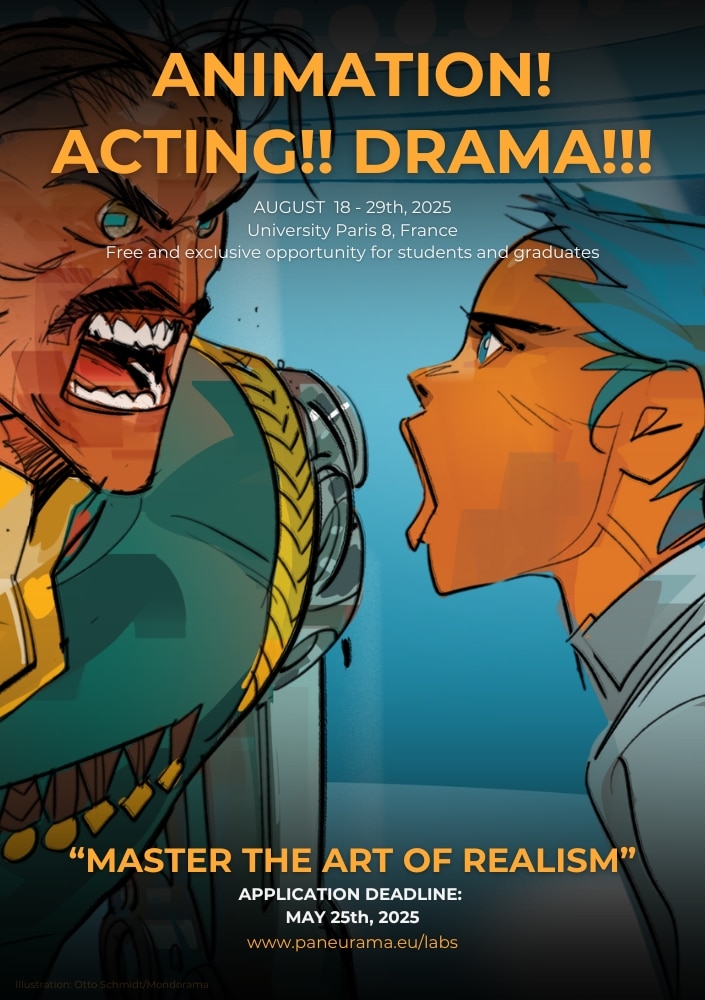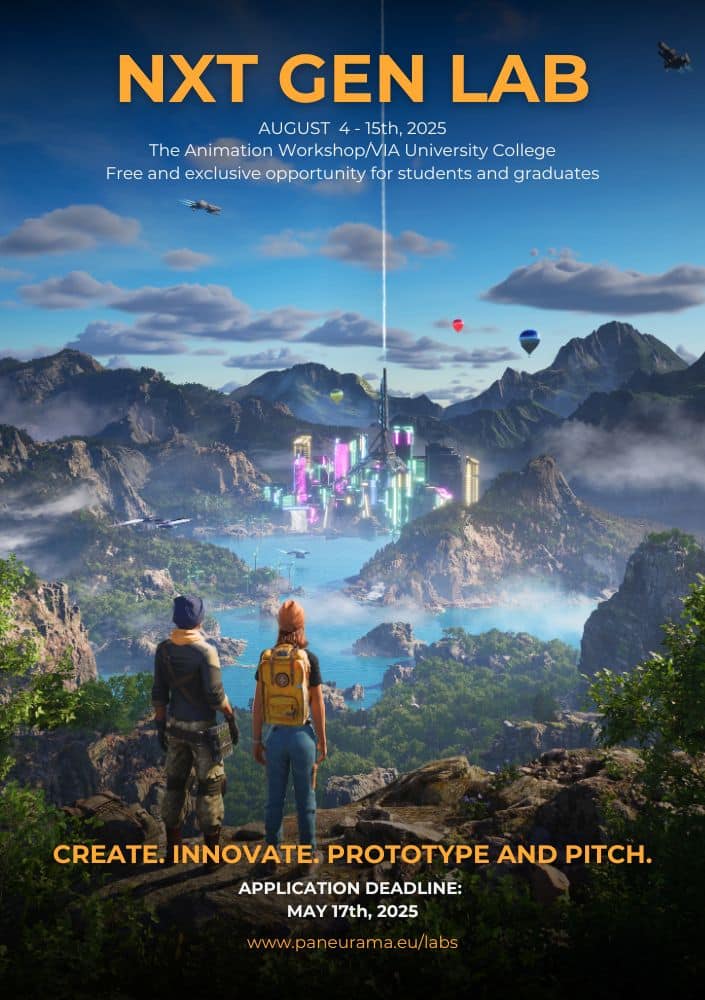We asked our team from the PANEURAMA project to briefly introduce themselves, share the areas they are working on, and respond to some questions addressing current challenges and opportunities in the industry.
We hope you will enjoy reading their insights. The first interviewee is Chris Ebeling from Beyond Horizons.

CHRIS EBELING
Chief Creative Officer @Behaviol
Director @Beyond Horizons
Q: Can you provide a brief overview of yourself, the industry you work in, and your professional experience?
Worked for almost 20 years in the industry, from young trainee to junior comp/animator to senior/lead animator and creative director, Chief marketing officer (CMO) and Chief creative officer (CCO).
I am also entrepreneurial, having co-founded one start-up, Virtually Human Studios, as well as joined another, BEHAVIOL, and also helped ideate and create the UTS ANIMAL LOGIC ACADEMY, which focuses on industry-led teaching in the digital space.
As a digital artist, I worked on many movies such as; The Lego Movie, Lego Batman Movie, Happy Feet 2, Great Gatsby, Gods of Egypt, Spiderman, John Wick, Guardians of Ga’hoole… As well as on TV shows, games, and trailers.
I’ve taught animation at a Bachelor’s level as well as teaching innovation and creative ideation at a Master’s level.
Currently, I have my own Digital Consulting company called Beyond Horizons that focuses on emerging technologies for the digital industry and education sector.
Q: In recent years, what do you consider the most significant changes within your industry? How does it affect you or your company? Could you give some examples?
Working remotely and AI.
Working remotely has been a massive shift in this space, the ability to work anywhere at any time is huge. But it also has its downsides (loneliness, harder communication, less learning from your surroundings)…
Usually at a workplace, you learn by being around your peers, you see new tricks and tips, sometimes tools that others use that you hadn’t considered, or new workflows and approaches to work. This happens often in an office work environment, which helps accelerate everyone and the production… Naturally, loneliness can affect you as an artist or worker, however, we often like to be alone and focus on our work. But having the energy and passion of others around you is a bonus… always…
AI and the growth of these tools is huge. Not a day goes by without using ChatGPT, and if I’m developing story ideas, and need visuals, Midjourney is great to have handy. I know there are a tonne of other AI applications that can be used to speed up workflows, but for me, those two are go-to’s. How this affects my company and work, is that I can write ideas and concepts much faster. I can feed ChatGPT all the info I need to know, and ask it the right questions, and it will draw on this info and more to give me something I can work with… It’s a starting spot, a brainstorm, as with any ideation… and a damn useful one as well. It saves me so much time.
Q: What, in your opinion, are the primary challenges currently faced by the industry?
Understanding AI and where to use it, and where not.
We need to understand how to use it ethically. It’s still a bit of a Wild West right now, where rules and regulations will be needed to protect “us”.
Skills gap from student to professional. Too often students come out of college or animation school and think they are going to walk straight into a job. This is very rare.
We need to provide better education or modules to add to education, that can help upskill these students and keep their skills relevant to industry. Have more industry-led education like UTS ALA or top-up modules like PANEURAMA.
Q: Could you please identify the most significant opportunities within the industry?
The most significant opportunity for me is creating new innovative digital products that use and focus on emerging technologies.
Whether building a Web3 game an AI-driven game… or both, I see a huge opportunity for creative ideation and new products to spawn from digital innovators who dare to try to make something new.
This is not just for 3D, gaming and storytelling, these can be applications that help speed up your everyday life… Using AI for a shopping list generator… or for math tutoring… Mixed reality glasses to help with language.. and so on…
With the exponential growth of tech, new opportunities are present every day… we just need to be brave enough to try them, and then be committed to the journey to create them.
Other opportunities for an artist starting out, is that there is so much digital content needed to be made these days. Not just for film and TV, but for streaming platforms, games, new digital experiences, VR/AR/MR, and metaverse… The world is only going to become more digital… so by understanding digital concepts and needs, you will quickly see where the opportunities are.
Q: What do you think are the most important hard skills in your industry?
Human skills are key and what I would call the Hardest Skills to master (see below). Being a good communicator, a good colleague, someone who works well in a team, with a team and doesn’t let their EGO always get in the way. Having some ego is good, it all depends on your role in the company. A CEO needs some ego, a leader some as well… but they must also have the ability to know when to put it aside… This is key.
Hard skills, as in software or ability to perform, I believe it depend on what area and department you want to work in. As an animator, you need to know the principles of animation, understand acting, composition, staging, and performance, and then have the experience to keyframe this out in any software. Whether Maya, blender, soft image (lest we forget), animation principles and approaches are the same. A definite hard skill that any artist should focus on, is real time engines. Real-time engines such as Unreal and Unity are becoming more and more used across industries… not just games. I would say it’s imperative that anyone serious about a career in the digital space, needs to understand how these work.
As for me, and the industry I’m currently in, startup space, and our immediate needs, we often need generalists and artists who can do a bit of everything but at a high level. This is usually because we have tighter budgets to start with, and need bang for our buck. Finding an artist who can do the job of many is of course the ideal! However, these are hard to find! Let me make it clear that in bigger games studios and movie studios (established entertainment studios) you don’t need generalists as much as you do in smaller indie dev startups.
Q: What recommendations would you offer to educational institutions to foster closer collaboration with the industry? Could you share some examples?
Start the dialogue. Most Industry professionals love to help and give back to education. It can be hard to balance time and resources, as most professionals are paid by the hour. However, starting the dialogue as an educational institution, and finding out what the industry needs are today, and what they most likely will be like tomorrow, then you are in a good position to cater to these needs. Ideally, you can sway the industry to come give master classes, or keynotes on their company’s workflow and work, to help excite and challenge students to new working philosophies and methodologies. And teachers/mentors as well. The ideal scenario is where you find the right balance of using the industry as a resource and inspiration to help guide education on current and future needs, which institutions can bring into their curriculum, to help make their students more industry-ready.
Q: As an industry representative, what do you think companies should focus more on to better prepare young artists for their careers?
Specializing in areas of digital arts. If you want to be an animator, Animate. ( but also understand rigging, how it works, understand layout and cameras, and also show them how to previsualize )
If you want to be a compositor, then have them composite (but also light and set up scenes to render, maybe even some post-processing)
Modellers should focus on modelling, soft and hard surfaces (zbrush) as well as texturing and shaders (look development) using Substance Painter and Arnold.
An artist needs an area of specialisation, however should also know the surrounding departments that flow in and out of the one she/he is specialising in. This will help make him/her a more employable artist.
Understanding Real-time engines (Unreal) – this is the engine and 3D application of the future. You need to know how your specialisation fits into it.
Soft Skills/Human Skills – understanding that it takes a team, teamwork is important, communication, accountability, responsibility, punctuality etc…
Q: What do you think are the most important soft skills in the industry, and could you advise on how to develop them?
I like to call them Hard skills or Human Skills…
a) because they are hard!
b) because we are humans… and complex ones that come in many shapes and sizes…
Teamwork is key, I believe this solves most of the Hard skills… from proper teamwork, we learn to communicate, take accountability for our role in the team, leave our egos in check, and understand there is no “I” in TEAM. In a team you are only as strong as your weakest link, understanding this will make you commit to the team concept more, and understand that we all help one another in production.
Developing teamwork is rather simple… Create one project together as a team, and have students choose their areas of specialisation and help them choose based on their strengths and weaknesses. This can be done with many small teams of 5, however, from my experience I’ve seen the best results when you treat it like a real production.
Q: Could you provide suggestions or recommendations for students and graduates aiming to succeed in the current market?
Find out what, where, and what you would like to specialize in and focus 80% of your time on this.
Understand that you can be more than a specialist. Understand the complementary departments around your area of expertise… An Animator understands cameras and lensing, as well as rigging. Understand that anything worth doing is hard work: That it takes time, and that you must fall in love with the process.
Understand that through failing we learn… we win some, we learn some… through our mistakes and failures is where we grow… so make many of them! And grow stronger.
Understand that you won’t just get your dream job straight away. Sometimes you just need to take a job in a company, where you can navigate your way to the dream job. Many stories like this in many industries. Starting as a kitchen helper and cleaner can lead you to become one of the greatest chefs. From showrunner to director… from set builder to actor… from Junior compositor to Chief Creative Officer and Entrepreneur.
Don’t be afraid to learn something new. Always be learning… technology shifts always, and you will put yourself in a better situation for success, if you keep an open mind for these shifts, and learn a bit about the… Real-time engines and Artificial intelligence would be the two I would ask anyone to be aware of today.
Be nice.. treat people like you want to be treated. Understand that it takes a team to win and deliver the best work.
Leave your ego at the door, and put in the work… and fall in love with the process… then it becomes fun.

